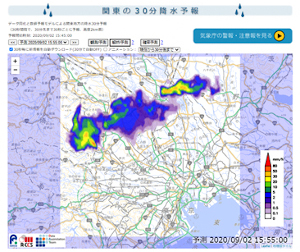Jul. 15, 2021
Predicting torrential rain with the supercomputer Fugaku
 The RIKEN weather website (but a different experiment)
The RIKEN weather website (but a different experiment)A research group led by scientists from the RIKEN Center for Computational Science will be using the supercomputer Fugaku to make rain predictions for the Tokyo metropolitan area. During the experiment, predictions of conditions up to 30 minutes into the future will be updated every 30 seconds, with a resolution of 500 meters, based on observational data gathered by the state-of-the-art Multi-Parameter Phased Array Weather Radar (MP-PAWR) operated by the National Institute of Information and Communications Technology (NICT) in Saitama City. Using advanced data assimilation, the key technique studied by the group, the observational data will be incorporated into simulations run on Fugaku, allowing for extremely accurate predictions. Using Fugaku’s power, the group will run an ensemble of 1,000 simultaneous simulations.
According to Takemasa Miyoshi, who leads the research group from a number of institutes, “We believe this research will help contribute to the Japanese government’s vision of an ultra-smart society dubbed Society 5.0, by linking the virtual world on Fugaku to the real world in real time, to help predict sudden torrential rain, which has become an increasing risk due to climate change.” Miyoshi cautions, however, that the current work is experimental, intended to ensure that the method is technically feasible, and there is no guarantee that it will be successful and that the predictions will be useful in the real world, so recommends against using the experimental forecasts for actual decisions about going out.
The forecast data generated by the experiment will be published on RIKEN's weather forecast research website and will also be available from MTI's smartphone application 3D Amagumo Weather, from noon on July 20.
